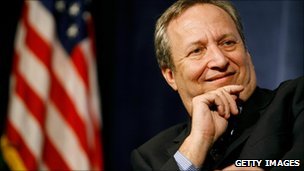 President Barack Obama's top economics advisor, Larry Summers, is to leave the administration at the end of the year.
President Barack Obama's top economics advisor, Larry Summers, is to leave the administration at the end of the year.
Under Mr Summers, the council has been at the heart of the government's economic policy making.
The president praised him for "brilliance, experience and judgement" at "a time of great peril" for the US.
But the departure of Mr Summers, who is returning to a post at Harvard University, is the latest from the White House economy team.
In July budget director Peter Orszag stepped down and chairwoman of the Council of Economic Advisers, Christina Romer left earlier this month.
Earlier on Tuesday, the US Federal Reserve issued a downbeat assessment of the US economy and said that its main interest rate was likely to be kept at current levels close to zero for a long time.
In a statement issued after a regular policy meeting the Fed also said it was prepared to take additional measures to support the economy if needed.
The White House said Mr Summers had been an architect of the 2009 Recovery act - aimed at jump-starting the US economy, and had also, among other roles, led an overhaul of the automobile industry.
"I will always be grateful that at a time of great peril for our country, a man of Larry's brilliance, experience and judgment was willing to answer the call and lead our economic team," President Obama said.
"Over the past two years, he has helped guide us from the depths of the worst recession since the 1930s to renewed growth. And while we have much work ahead to repair the damage done by the recession, we are on a better path thanks in no small measure to Larry's wise counsel."
Meanwhile, Mr Summers said he would "miss working with the president and his team on the daily challenges of economic policy making".
Economy lost momentum
The US economy - with unemployment close to 10% - is set to dominate November's mid-term congressional elections.
The US recession ended in June 2009, but recovery has lost momentum this year with growth at an annualised rate of 1.6% in the second three months of 2010.
The Fed cut key interest rates to near zero in December 2008 and later put money into the economy by buying $1.7 trillion in US government debt and mortgage bonds.
In its statement on Tuesday, the Fed said it would "continue to monitor the economic outlook and financial developments and is prepared to provide additional accommodation if needed to support the economic recovery and to return inflation, over time, to levels consistent with its mandate".



